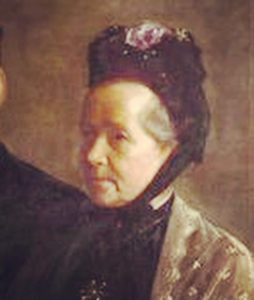On this day, 100 years ago, Old Scholar and campaigner for women’s rights, Anna Haslam, died after a lifetime of making a difference for women. Described by her colleagues as ‘one of the giants of the women’s cause’, Anna took part in virtually every campaign for women’s rights in Ireland during the latter half of the 19th century.
When she first cast her vote in 1918, at the age of 90, Anna was paraded to the polling booth by jubilant members of the suffrage movement.
Radicals and moderates alike were keen to show their appreciation to this woman, the 16th of 17 children born in Youghal, Co Cork, to Jane (nee Moor) Fisher, philanthropist and anti-slavery campaigner, and her husband Abraham, an insurance agent and miller. Anna’s parents, as Quakers, believed girls should have the same right to education as boys.
Anna attended the school when it was still based in Castlegate. Throughout her life, she regularly attended Quaker provincial meetings and would later describe her Quaker faith as her training in gender equality, because Quakers afforded more rights to their female members than any other faith at the time.

Historian Mary Cullen wrote in 2009 of Anna, “It is no coincidence that the pioneering Irish women’s rights campaigners came from backgrounds in philanthropy. Their driving force was the assertion that women were autonomous human persons with both the right and responsibility to direct their own lives, develop their individual potential and share in shaping the direction of society.
Starting in the mid-19th century, four main feminist campaigns developed in Ireland, running more or less concurrently and all related to the overall objective. In those for married women’s control of their property and for repeal of the Contagious Diseases Acts, action in Ireland was essentially part of an English-based campaign. In those for educational reform and the parliamentary franchise, the campaigns operated in different political contexts and were more separate. Anna Haslam was active in all these campaigns, and saw them all as vital for women’s advancement and mission. However, she is best remembered today for her work for votes for women.
The parliamentary franchise was important both as a recognition of women’s citizenship and as empowering them to reform society through influencing legislation. In 1866, in anticipation of the 1867 extension of the male franchise, a petition to parliament to include women on the same terms as men in the legislation was hastily drawn up and within a fortnight gathered 1,499 women’s signatures. Among the fifteen with Irish addresses was that of Anna Haslam. When the petition was not successful, organised action began. In England, the National Society for Women’s Suffrage was founded in 1867 and in Ireland the Northern Ireland Society for Women’s Suffrage in 1871.
Anna was secretary for the Dublin Women’s Suffrage Association from its inception until 1913 when she stood down and was elected life-president. She did not miss a single meeting and was a driving force in the organisation. The original membership was predominantly Quaker. It worked to educate public opinion by letters to the newspapers and organising drawing room and public meetings, the latter whenever the opportunity of high-profile women speakers presented itself. Though herself unionist in sympathy, Anna actively encouraged women of all political and religious affiliations to join the Irish Women’s Suffrage and Local Government Association.
Anna Haslam’s contribution to the development of Irish feminist activism was enormous, as was that of the suffrage association she founded. She combined strong and effective leadership with an ability to win the respect and admiration of many who disagreed with her on various issues. All descriptions of her by contemporaries note her vigour and enthusiasm throughout her extraordinarily long and active career. To this was added the quality of her contribution, her clarity of thought and expression, her long presence as an articulate and confident voice steadily and consistently asserting the self-evident validity of women’s claims, and, not least, the inclusiveness of her concept of sisterhood and Irishness. Though herself a unionist and from a Quaker background, she successfully drew nationalist, Catholic and socialist young women into the suffrage movement and retained their esteem and affection to the end. Her own association accurately summed up her life’s work in its 1917 report which described her as ‘one of the giants of the women’s cause.’
Anna had worked at Ackworth School in 1847-48 where she met Thomas Joseph Haslam, a co-worker who became her husband in 1854. By 1858 they had moved to Dublin. As well as her activism, Anna was a businesswoman and the family breadwinner. When ill-health forced Thomas to stop working in 1866, she supported them both by running a small stationery and toy shop from her home in Dublin. Yet she still had time to campaign for the vote for women and pursue other interests. She practiced homeopathy, was a member of the Rathmines Literary Society, and belonged to a number of social reform groups from the Irish Society for the Prevention of Cruelty to Children to the Fresh Air Society, a body that brought city-children to spend a day by the sea or in the countryside. She opposed slavery, campaigned for education for all and fought for social reform.
Anna and Thomas’ relationship remained very close into extreme old age, and their visible mutual affection was commented on by most who knew them in later life. Thomas died in 1917. Anna’s last years were spent in reduced circumstances, probably due to the erosion of investment income by wartime inflation. She died on November 28th, 1922.
